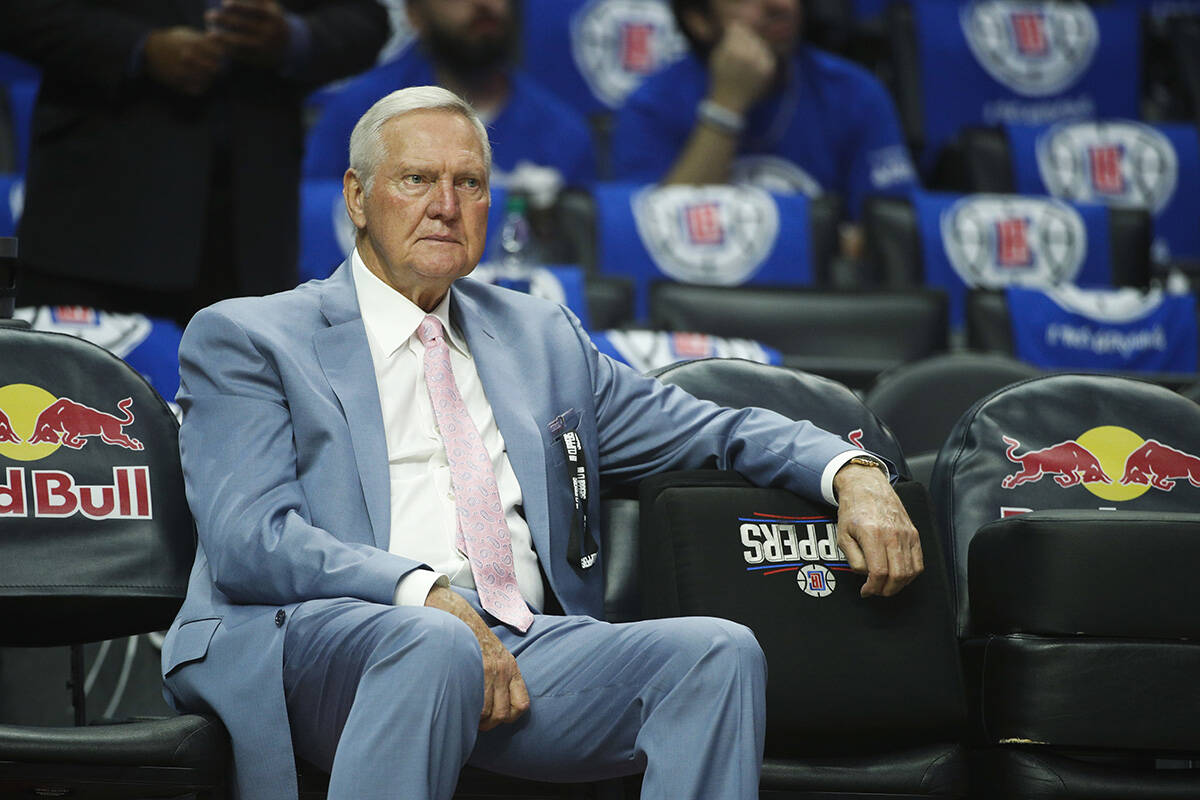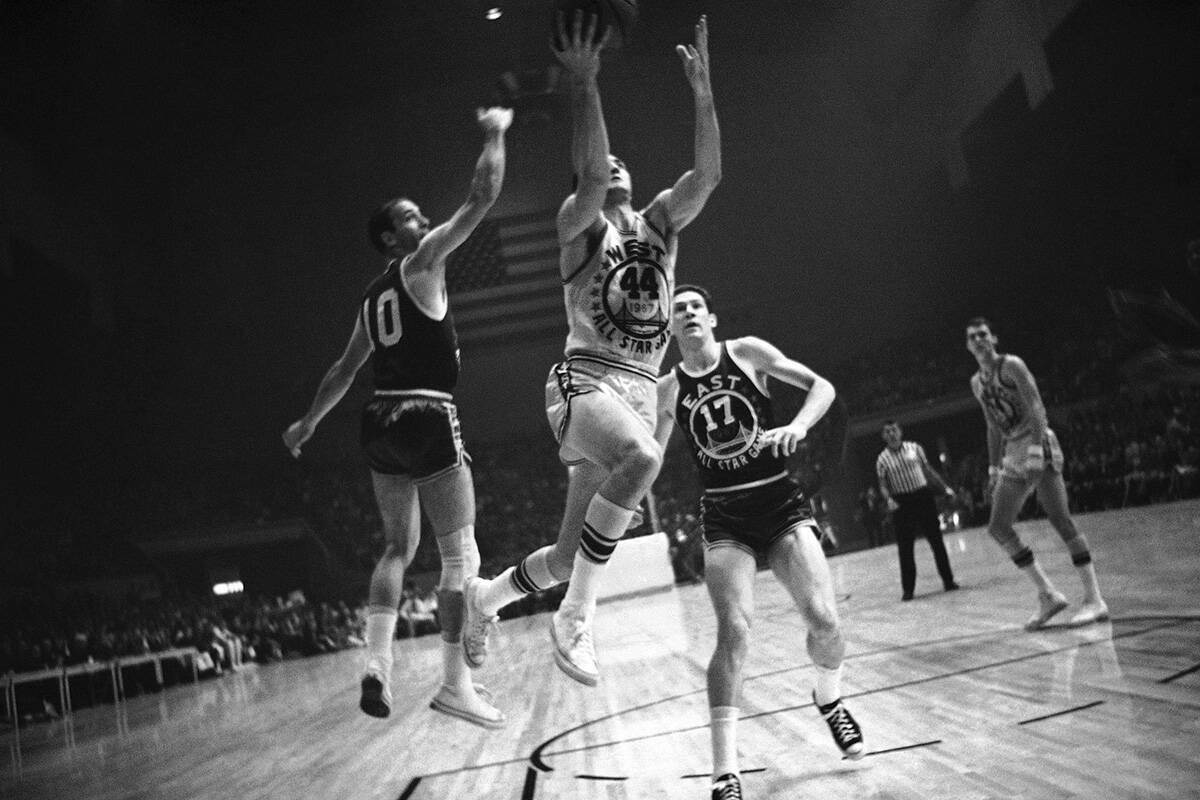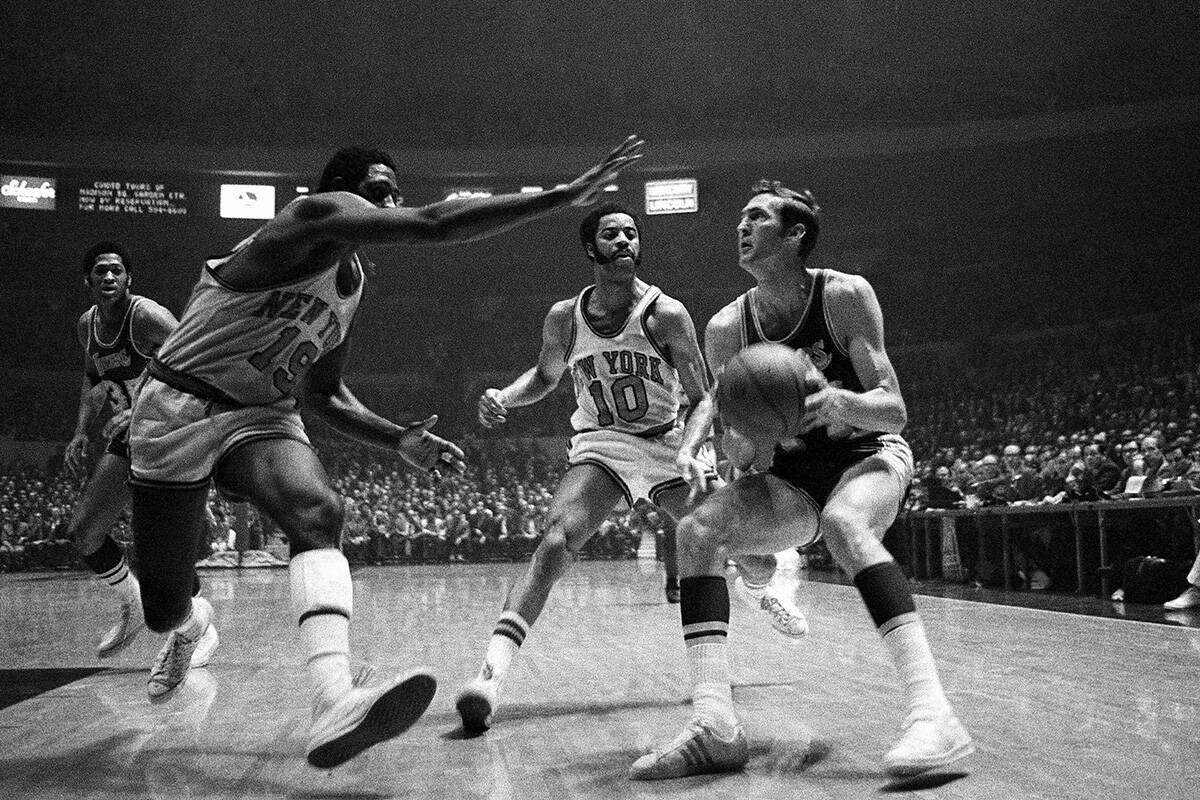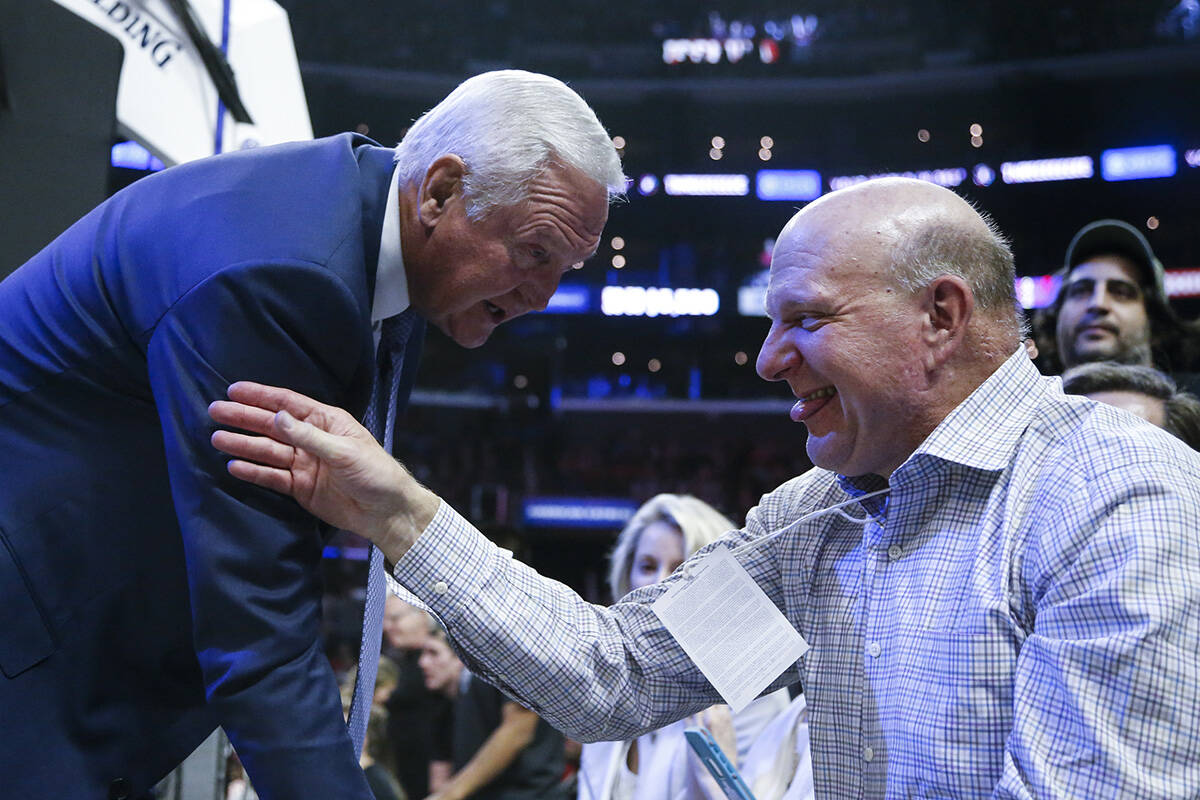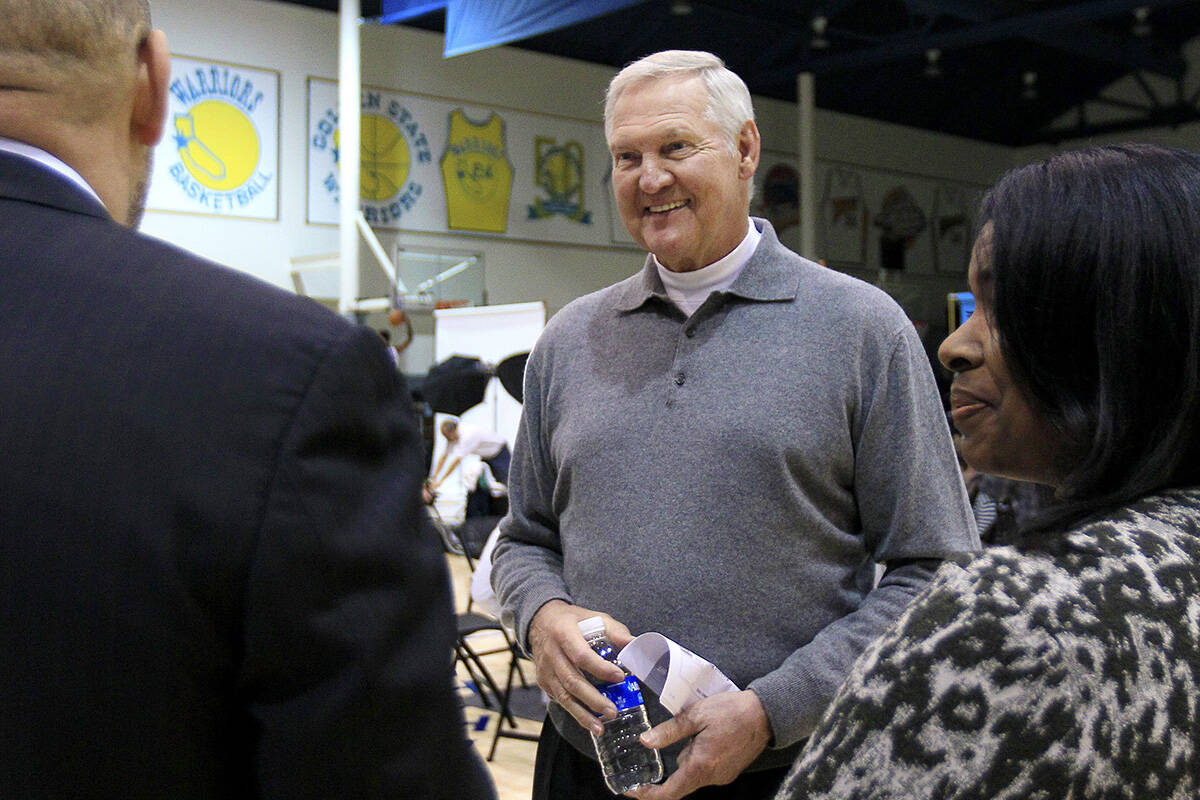Jerry West, 3-time Hall of Fame selection, dies at 86
Jerry West, who was selected to the Basketball Hall of Fame three times in a storied career as a player and executive, and whose silhouette is considered to be the basis of the NBA logo, died Wednesday morning, the Los Angeles Clippers announced.
He was 86.
West, nicknamed “Mr. Clutch” for his late-game exploits as a player, was an NBA champion who went into the Hall of Fame as a player in 1980 and again as a member of the gold medal-winning 1960 U.S. Olympic Team in 2010. He will be enshrined for a third time later this year as a contributor, and NBA Commissioner Adam Silver called West “one of the greatest executives in sports history.”
“He helped build eight championship teams during his tenure in the NBA — a legacy of achievement that mirrors his on-court excellence,” Silver said. “And he will be enshrined this October into the Naismith Basketball Hall of Fame as a contributor, becoming the first person ever inducted as both a player and a contributor. I valued my friendship with Jerry and the knowledge he shared with me over many years about basketball and life.”
West was “the personification of basketball excellence and a friend to all who knew him,” the Clippers said in announcing his death. West’s wife, Karen, was by his side when he died, the Clippers said. West worked for the Clippers as a consultant for the last seven years.
He was an All-Star in all 14 of his NBA seasons, a 12-time All-NBA selection, part of the 1972 Lakers team that won a championship, an NBA Finals MVP when the Lakers lost to the Boston Celtics in 1969 — the first year that award was given out, and still the only time it went to a player on the losing team — and was selected as part of the NBA’s 75th anniversary team.
West was general manager of championship teams with the Los Angeles Lakers, helping build the “Showtime” dynasty. He also worked in the front offices of the Memphis Grizzlies, the Golden State Warriors and the Clippers. Among his many highlights as an executive with the Lakers: he drafted Magic Johnson and James Worthy, then brought in Kobe Bryant and eventually Shaquille O’Neal to play alongside Bryant.
His basketball life bridged generations: West played with Elgin Baylor, whom he called “the most supportive and the greatest player of that era,” and Wilt Chamberlain. As a coach and executive, he worked with a who’s-who of NBA stars from the last 40 years: Kareem Abdul-Jabbar, Johnson, Worthy, O’Neal, Bryant, Stephen Curry, Klay Thompson, Kevin Durant, Kawhi Leonard and Paul George among them.
“I marvel at them, at the joy they brought basketball fans all over the world,” West said in 2019.
Even in the final years of his life, West was considered basketball royalty. He routinely sat courtside at Summer League games in Las Vegas, often watching many games in a day while greeting long lines of players — LeBron James among them — who would approach to shake his hand.
“The game transcends many things,” West said while attending Summer League last year. “The players change, the style of play may change, but the respect that you learn in this game never changes.”
James, on social media, offered his condolences: “Will truly miss our convos my dear friend! My thoughts and prayers goes out to your wonderful family! Forever love Jerry! Rest in Paradise my guy!” the NBA’s all-time scoring leader wrote Wednesday.
West is 25th on the NBA’s all-time scoring list, and while the league has never confirmed that West was in fact the model for its logo — a player dribbling a ball, set against a red-and-blue background — the league has never said otherwise, either.
“While it’s never been officially declared that the logo is Jerry West,” Silver said in 2021, “it sure looks a lot like him.”
West is still the NBA Finals’ all-time leader in total points, along with field goals made and attempted as well as free throws made and attempted. He played in the title series nine times with the Lakers; his teams went 1-2 against the New York Knicks, and 0-6 against the Celtics.
“Those damn Celtics,” he often said.
West also hit one of the most famed shots in finals history, a 60-footer at the buzzer of Game 3 of the 1970 series between the Knicks and Lakers to force overtime.
Tributes from across the sports world quickly poured in Wednesday morning. The Los Angeles Dodgers released a statement calling West “an indelible figure on the Los Angeles sports landscape for more than 60 years,” and the NBA was planning a pregame tribute to West before Game 3 of the NBA Finals between the Celtics and Dallas Mavericks on Wednesday night.
“Jerry West is one of my favorite people that I had the honor to get to know in the NBA,” Miami Heat managing general partner Micky Arison said Wednesday. “He welcomed me to the league, offered advice from the first day, and asked nothing in return. He will be missed.”
Michael Jordan said he considered West “a friend and mentor — like an older brother to me.”
“I valued his friendship and knowledge,” Jordan said. “I always wished I could have played against him as a competitor, but the more I came to know him, I wish I had been his teammate. I admired his basketball insights and he and I shared many similarities to how we approached the game.”
A native of Chelyan, West Virginia, West was known as a tenacious player who was rarely satisfied with his performance. He grew up shooting at a basket nailed to the side of a shed and often shot until his fingers bled. He became the first high school player in state history to score more than 900 points in a season, averaging 32.2 points in leading East Bank High to a state title.
Basketball, he would later reveal, was his therapy.
In his memoir, “West by West: My Charmed, Tormented Life,” West chronicled a lifelong battle with depression. He wrote that his childhood was devoid of love and filled with anger as a result of an abusive father. He often felt worthless, and to combat that, he said he put his energy into playing the game.
West led West Virginia University — where he is still the all-time leader in scoring average — to the NCAA final in 1959, when the Mountaineers lost by one point to California.
A year after he won Olympic gold in Rome, West joined the Lakers, where he spent his entire pro playing career. He was honored as one of the league’s 50 greatest players in 1996 and when the league expanded the polling to 75 players to commemorate its 75th anniversary in 2021, West was selected again.
“You know, it never ceases to amaze me the places you can go in this world chasing a bouncing ball,” West said in 2019, when he was awarded the Presidential Medal of Freedom — the nation’s highest civilian honor — by then-President Donald Trump. “My chase began in Chelyan, West Virginia, where I strung a wire basket with no net to the side of a bridge. If your shot didn’t go in, the ball rolled down a long bank and you would be chasing it forever. So, you better make it.
“I was a dreamer. My family didn’t have much, but we had a clear view of the Appalachian Mountains, and I’d sit alone on our front porch and wonder, ‘If I ever make it to the top of that mountain, what will I see on the other side?’ Well, I did make it to the other side, and my dreams have come true. I’ve been able to see the sides, thanks to that bouncing ball.”
Associated Press Writer John Raby contributed to this report.



